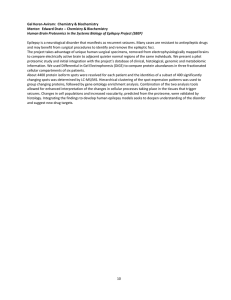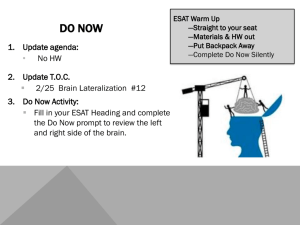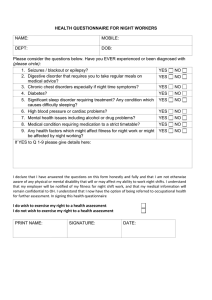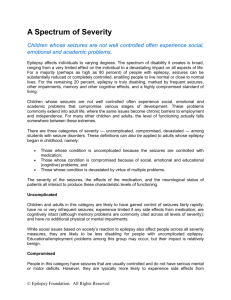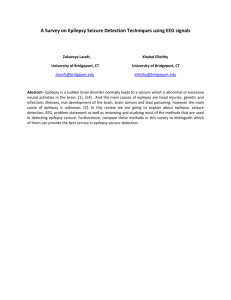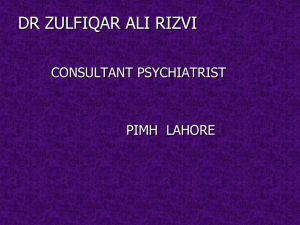View PDF
advertisement
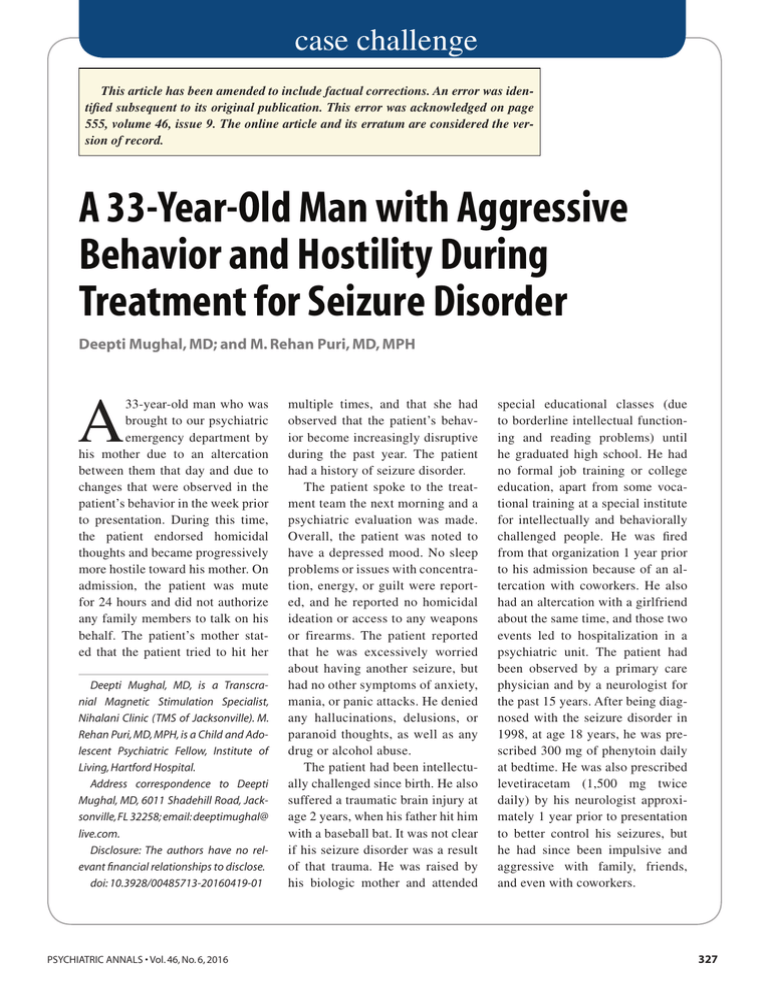
case challenge This article has been amended to include factual corrections. An error was identified subsequent to its original publication. This error was acknowledged on page 555, volume 46, issue 9. The online article and its erratum are considered the version of record. A 33-Year-Old Man with Aggressive Behavior and Hostility During Treatment for Seizure Disorder Deepti Mughal, MD; and M. Rehan Puri, MD, MPH A 33-year-old man who was brought to our psychiatric emergency department by his mother due to an altercation between them that day and due to changes that were observed in the patient’s behavior in the week prior to presentation. During this time, the patient endorsed homicidal thoughts and became progressively more hostile toward his mother. On admission, the patient was mute for 24 hours and did not authorize any family members to talk on his behalf. The patient’s mother stated that the patient tried to hit her Deepti Mughal, MD, is a Transcranial Magnetic Stimulation Specialist, Nihalani Clinic (TMS of Jacksonville). M. Rehan Puri, MD, MPH, is a Child and Adolescent Psychiatric Fellow, Institute of Living, Hartford Hospital. Address correspondence to Deepti Mughal, MD, 6011 Shadehill Road, Jacksonville, FL 32258; email: deeptimughal@ live.com. Disclosure: The authors have no relevant financial relationships to disclose. doi: 10.3928/00485713-20160419-01 PSYCHIATRIC ANNALS • Vol. 46, No. 6, 2016 multiple times, and that she had observed that the patient’s behavior become increasingly disruptive during the past year. The patient had a history of seizure disorder. The patient spoke to the treatment team the next morning and a psychiatric evaluation was made. Overall, the patient was noted to have a depressed mood. No sleep problems or issues with concentration, energy, or guilt were reported, and he reported no homicidal ideation or access to any weapons or firearms. The patient reported that he was excessively worried about having another seizure, but had no other symptoms of anxiety, mania, or panic attacks. He denied any hallucinations, delusions, or paranoid thoughts, as well as any drug or alcohol abuse. The patient had been intellectually challenged since birth. He also suffered a traumatic brain injury at age 2 years, when his father hit him with a baseball bat. It was not clear if his seizure disorder was a result of that trauma. He was raised by his biologic mother and attended special educational classes (due to borderline intellectual functioning and reading problems) until he graduated high school. He had no formal job training or college education, apart from some vocational training at a special institute for intellectually and behaviorally challenged people. He was fired from that organization 1 year prior to his admission because of an altercation with coworkers. He also had an altercation with a girlfriend about the same time, and those two events led to hospitalization in a psychiatric unit. The patient had been observed by a primary care physician and by a neurologist for the past 15 years. After being diagnosed with the seizure disorder in 1998, at age 18 years, he was prescribed 300 mg of phenytoin daily at bedtime. He was also prescribed levetiracetam (1,500 mg twice daily) by his neurologist approximately 1 year prior to presentation to better control his seizures, but he had since been impulsive and aggressive with family, friends, and even with coworkers. 327 case challenge DIAG N OS I S Adverse Effect of Levetiracetam After the patient’s psychiatric assessments, it was determined that his mood disorder was due to the introduction of levetiracetam for his seizures. Psychiatric education about the patient’s symptoms of depression, anxiety, and aggression was provided. The importance of taking lamotrigine and cross-titrating it with levetiracetam instead of phenytoin was also discussed. Phenytoin is an enzyme inducer and would lower lamotrigine levels by inducing its metabolism in the liver. Lamotrigine would be able to regulate the patient’s seizures as well as his mood and behavioral problems. After gathering all the information from the patient, it was evident that his aggressive behavior coordinated with the initiation of levetiracetam for his seizure disorder. After discontinuation of levetiracetam and a short course of cognitive-behavioral therapy, the patient showed improvement in his behavioral mood symptoms at a follow-up appointment. DISCUSSION Levetiracetam is an anticonvulsant medication used to treat epilepsy. It is widely used for the treatment of focal or generalized seizures because, compared with other antiepilectic drugs, there are fewer side effects in terms of liver, 328 kidney, and drug interactions. Unfortunately, levetiracetam can have other adverse effects, including anger, agitation, hostility, and depression. Approximately 12% to 15% of all patients will suffer from these adverse effects.1 Anger and hostility are more likely to emerge during long-term treatment, especially in patients who are prone to or already suffer from psychiatric disorders. Although there are many studies in the recent literature that support the existence of these adverse ef- Levetiracetam can have other adverse effects, including anger, agitation, hostility, and depression. fects, there is also a hypothesis that some feature(s) related to epilepsy may be the cause of many behavioral events, rather than this specific antiepileptic drug.2 Epilepsy is a chronic neurologic disorder characterized by seizures combined with brain alterations that increase the chance of future seizures.3 The diagnosis of epilepsy requires seizures to occur either spontaneously or after particular triggers (as has been noted in certain epilepsy syndromes). Many factors have been associated with epilepsy, among which are brain trauma, strokes, and drug and alcohol abuse, but in many cases a direct cause has not been identified.4 In such cases, mutations in several genes have been also linked to several types of epilepsy.4 Epilepsy is managed medically with anticonvulsant drugs that are prescribed to control seizures, although about 20% of patients with epilepsy continue to have breakthrough epileptic seizures.5 Some patients seem to be more biologically vulnerable to psychiatric adverse effects, and if taking levetiracetam, they should be closely monitored for changes in behavior. Acute brain insult, such as stroke, infection, trauma, or a lesion on the brain, can cause a normal brain to develop epilepsy over time. This is called epileptogenesis. Understanding the development and progression of seizures is complex, and efforts have been made to interpret clinical symptoms and to guide strategies for therapy. Uncontrolled seizures can affect the physical, emotional, and social functioning of patients, causing them to have excess anxiety.6 Prevention of seizures is important because of the neurologic consequences that repeated seizures can have on brain function. Neuronal loss, gliosis, parenchymal microhemorrhages, perivascular atrophy, and gliosis are only some of those consequences.7 CONCLUSION It is not certain in our patient if his behavioral problems were related to his epilepsy or due to the addition of levetiracetam, but his aggression and hostility were markedly increased since the introduction of the medication. Research has shown that some patients who are treated with levetiracetam have also developed behavioral abnormalities that were Copyright © SLACK Incorporated case challenge improved after discontinuation of the drug.8 In four patients who developed irritability and anger after starting treatment with levetiracetam, it resolved immediately after stopping the medication.8 It has been also proven in a randomized, double-blind, parallel-group study in adults with partial seizures that lamotrigine significantly decreased anger-hostility scores relative to levetiracetam at the end of a 20-week treatment period.9 Lamotrigine also improved other mood symptoms versus levetiracetam. Clinicians need to be aware of the adverse effects of levetiracetam PSYCHIATRIC ANNALS • Vol. 46, No. 6, 2016 when treating patients with seizure disorders. REFERENCES 1. Abou-Khalil B. Benefit: risk assessment of levetiracetam in the treatment of partial seizures. Drug Saf. 2005;28:871890. 2. Cramer JA, De Rue K, Devinsky O, Edrich P, Trimble MR. A systematic review of the behavioral effects of levetiracetam in adults with epilepsy, cognitive disorders, or an anxiety disorder during clinical trials. Epilepsy Behav. 2003;4(2):124-132. 3. Fisher R, van Emde Boas W, Elger C, Genton P, Lee P, Engel J. Epileptic seizures and epilepsy: definitions proposed by the International League Against Epilepsy (ILAE) and the International Bureau for Epilepsy (IBE). Epilepsia. 2005;46(4):470-472. 4.Schachter SC. Iatrogenic seizures. Neurol Clin. 1998;16(1):157-170. 5. Cascino GD. Epilepsy: contemporary perspectives on evaluation and treatment. Mayo Clin Proc. 1994;69(12):11991211. 6. Shafer PO, Dilorio C. Self-management in epilepsy care: putting teen and families in the center—part one. Exceptional Parent. 2006;36(6):46-48. 7. Lopez JI, Pomposo-Gaztelu I. Surgical pathology of epilepsy. [Article in Spanish]. Rev Neurol. 2010;50(10):616-622. 8.Ben-Menachem E, Gillan E. Efficacy and tolerability of levetiracetam during 1-year follow-up in patients with refractory epilepsy. Seizure. 2003;12:131-135. 9.Mattes JA. Levetiracetam in patients with impulsive aggression: a doubleblind, placebo-controlled trial. J Clin Psychiatry. 2008;69(2):310-315. 329
